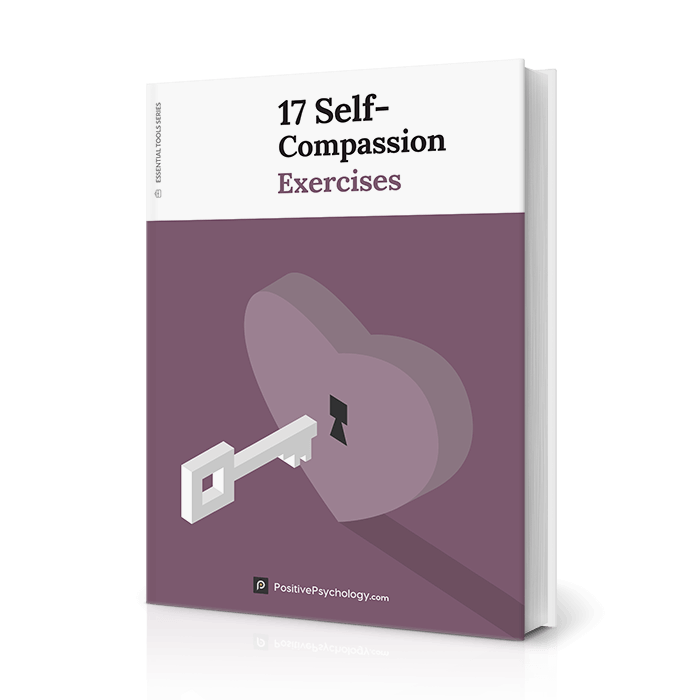Self-Esteem Journals, Prompts, PDFs, and Ideas
 Healthy self-esteem gives you the freedom to be YOU and fully enjoy life.
Healthy self-esteem gives you the freedom to be YOU and fully enjoy life.
When we are comfortable with who we are, we can develop more genuine relationships and seek out experiences that fulfill us. In this way, self-esteem can lead to greater levels of happiness and overall quality of life.
Fortunately, there is no shortage of information available on self-esteem. From the self-esteem movement to a plethora of self-help self-esteem books designed to bolster it, the concept is everywhere in society.
With this article, we’ll give you a full recap on valuable self-esteem tools such as the self-esteem journal, affirmations, and worksheets, and finally, an evaluation of the difference between self-esteem and self-acceptance.
Before you continue, we thought you might like to download our three Self-Compassion Exercises for free. These detailed, science-based exercises will not only help you increase the compassion and kindness you show yourself, but also give you the tools to help your clients, students, or employees show more compassion to themselves.
This Article Contains:
Why Have a Self-Esteem Journal?
Eating disorders, social withdrawal, and depression have all been linked to low self-esteem. A 2017 NBC report found that 85% of the American population suffers from low self-esteem (Alton, 2017).
As we hear stories of childhood bullying and increased incidences of depression, anxiety, and suicide, it is evident that “giving everyone a trophy” has not improved the self-worth of children, teens, or adults. There are more effective ways to foster self-esteem, self-acceptance, and self-love rooted in compassion.
Self-esteem is one of the most researched psychological constructs in society. Parents, teachers, coaches, and mentors are continually attempting to foster self-esteem in children, students, athletes, and employees. It is a critical component of success, life satisfaction, and wellbeing.
Self-esteem is an individual’s overall sense of value and attitude about themselves. Since we live with the thoughts, values, and attitudes we have about ourselves every second of our lives, their quality matters.
Signs of healthy self-esteem include:
- Pursuing things you enjoy and taking care of yourself
- Speaking up for yourself and being assertive
- Being able to focus on your own life without comparing yourself to others
- Not worrying so much about rejection, failure, or not fitting in
- Talking and thinking about yourself in a healthy way
- Being able to accept yourself and your situation as it is (self-acceptance)
Not only is self-esteem crucial for quality of life, but it is also a predictor of performance, goal setting, and success.
People with high self-esteem are more likely to set lofty goals, focus on personal development, and persist in the face of failure. In contrast, those with low self-esteem focus on fixing deficiencies, perform just enough to complete a task, and give up when they don’t succeed (Baumeister & Tice, 1985).
Research has also connected self-esteem with open-mindedness, inquisitiveness, truth-seeking, and (not surprisingly) self-confidence (Seyithan, 2019). Self-esteem is a cornerstone of mental, emotional, and physical development and performance in nearly every aspect of life.
In the insightful book Who Am I Without You? 52 Ways to Rebuild Self-Esteem After A Breakup, clinical psychologist Christina G. Hibbert (2015) discusses a method of increasing self-esteem. While the book is written about recovering from failed relationships, the concept is relevant to other areas of life.
She describes the concept of self-esteem as a pyramid of self-worth that includes:
- Self-awareness — Seeing ourselves exactly as we are, which includes strengths and weaknesses.
- Self-acceptance — Accepting all parts of ourselves.
- Self-love — Learning to appreciate ourselves as we are today but also in the process of growth. This includes self-compassion, self-care, and giving and receiving love.
- Self-worth — By practicing the parts above, we start to feel our true worth. Self-worth is a lifelong process.
Benefits of journaling
With this pyramid in mind, one practical way to begin fostering healthy self-worth is to start a self-esteem journal using this journal worksheet. Journaling is a way to express thoughts, feelings, and insights freely, and it is a useful tool for self-discovery and healing (Rowe, 2012).
By creating a record of our thoughts and emotions, free from judgment, we can develop a deeper understanding and acceptance of who we are and what we want our values and attitudes to be. The benefits of journaling are specifically why therapists have been recommending the technique of journaling to clients for years.
5 Ideas to Start Journaling

One of the biggest obstacles people have with journaling is a lack of time. I’ve also heard clients say they are “just not good at it.”
Some people think that it is boring, or they don’t know what to write about. On the contrary, some people don’t want to record their thoughts and feelings because they are in a dark space, and there is a fear that it will amplify negative emotions. However, this is precisely why a self-esteem journal is so effective.
The focus of this type of journal is on the positive aspects of life, meaningful moments from today, and dreams about a purposeful future despite the current emotional state. Here are some ideas to start the journaling process:
- Buy an inspirational notebook or tool for writing. Decide if you enjoy writing out your thoughts and feelings by hand or if you prefer to type. Writing your ideas and self-reflection by hand can have a more meaningful impact, but whichever method is easier for you to do daily is best.
- Pick a time. Schedule a time each day and create a routine to have consistency. Mornings and evenings are often effective times to journal. You can start the day in a positive space or finish it by reflecting on uplifting parts.
- Find a place. Ideally, pick a place that is quiet and has an atmosphere of solitude and peace. This might be a quiet corner of your home, a favorite coffee shop, or even outdoors in nature.
- Set a timer. Since one of the most significant obstacles to journaling is time, start small. Set a timer for 10 minutes. You will be amazed at what can happen in just 10 minutes a day.
- Select a prompt. Have a list of prompts ready so you have direction. There are endless lists of prompts that will help alleviate boredom and keep you motivated day to day.
8 Self-Love Journal Prompts
Prompts are a great tool for journaling. They can provide direction, motivation, and variety so the habit doesn’t become a monotonous task.
Remember, the purpose of a self-esteem journal is to foster positive reflection and increase self-awareness, self-acceptance, and self-compassion.
- Honor your strengths
Reflect on your three greatest strengths and jot down specific examples of actions, behaviors, or accomplishments that demonstrate them. - Find gratitude
List three things in your life that you are grateful for and provide details about why. How have they impacted you physically, mentally, emotionally, or spiritually? - Dream about your perfect day
But make it somewhat realistic. Describe what you would do, who you would be with, and what it would feel like. - Reflect on a recent success and what it says about your character
Think about something you have recently accomplished or a “win” that you have had. Then write about how this success demonstrates a positive quality or characteristic that you possess. - Acknowledge your efforts
Self-esteem is not just about success. It also recognizes that sometimes our efforts, determination, dedication, and persistence are part of the process and great attributes to develop. Think of a recent challenge you were faced with and how you persisted despite the outcome. - Reflect on people in your life who truly matter
Think about the relationship you have with them and why it is meaningful. Write about how they have impacted you as well as how you have affected them. - Write about qualities that make you unique
This is often harder than focusing on our strengths. But reflect on this and provide examples. - Write about your ideal future and achieving goals
Include attributes, skills, and resources you have that will help make this possible.
Our 5 Favorite Worksheets and PDFs
The My Wins Worksheet is an excellent tool for children or adolescents but can be adapted for adults as well. It helps the individual focus on positive experiences, qualities, and traits that they possess. The worksheet provides five distinct “boxes” where achievements, accomplishments, strengths, or attributes can be highlighted.
Clients should be encouraged to use creativity by drawing, creating symbols, or using phrases to fill each box with a “win” for the week. Not only is this a beneficial activity in the moment, it is also a great tool to reflect on over a period of time.
A Model of Healthy Self-Esteem identifies places where self-evaluations, unrealistic expectations, negative core beliefs, and unhealthy rules and assumptions can get in the way.
Exploring Character Strengths is a great way to assess personal strengths. Ten questions guide the participant to reflect on six areas in their life where they can identify different strengths used.
The Understanding Self-Confidence Worksheet is divided into three parts. It asks individuals to focus on a time they were confident, a time they were not, and then examine the differences. This can be a great way to reflect on what healthy self-esteem or self-worth looks like and some factors involved with it.
The Self-Esteem Journal For Adults Worksheet provides a template to create bullet points and foster positive thoughts. This can be used as a starting point for more in-depth journaling or on its own for a daily check-in.
More worksheets are available in our article Self-Esteem Worksheets and Activities for Teens and Adults.
Self-Love Affirmations

They have helped thousands of people make changes to behavior and thought patterns.
An affirmation works by reprogramming the mind to believe a stated concept. Self-affirmation theory (Cohen & Sherman, 2014) states that we can achieve a level of self-integrity by telling ourselves what we want to believe.
We can make affirmations in areas we value and then will act or behave in ways that are consistent with that value. In fact, brain scan images have shown that specific neural pathways strengthen when individuals practice self-affirmations (Cascio et al., 2015).
Self-love affirmations can include positive statements about your health, body, life, future, family, experiences, etc.
You might choose general statements like:
“I am worthy of love and joy.”
“I love the way my hair curls when it gets wet.”
You can pick affirmations that are present moment or future directed such as:
“I am willing to keep going, when things get tough, to achieve the success I deserve.”
Find statements that are meaningful, personal, and relevant.
Read our related post explaining Positive Self-Talk.
Self-Esteem vs. Self-Acceptance
Without self-acceptance, both psychological and physical wellbeing can suffer. Research from Harvard University suggests that poor self-acceptance can upset emotional control by directly disrupting brain regions that control it and by indirectly increasing stress signals. Individuals that feel negatively about themselves have less gray matter in brain regions that control emotions than individuals with a higher level of self-acceptance (Pillay, 2016).
Since low self-acceptance is linked with an increase in right-hemisphere brain activity, meditation, mindfulness, and particularly self-compassion can be practical tools for increasing it. Research has also found that people were more capable of accepting praise and displayed more brain connectivity after practicing loving-kindness meditation (Pillay, 2016). Here is an example of a loving-kindness meditation practice.
This information suggests that self-regulation, self-awareness, and self-transcendence may provide a scientific basis for increasing self-acceptance. Self-regulation involves refocusing negative emotions with positive aspects of the self and learning to see negative situations as opportunities.
Research has made connections between self-awareness and self-esteem (Cantley & Martin, 2020) and shown that self-awareness is something that can be taught. Finally, self-transcendence is the ability to connect with the world around you and depend less on your circumstances or situation to define you.
PositivePsychology.com Resources
Most efforts to improve self-esteem would benefit from shifting the focus to increasing self-acceptance, self-compassion, and self-awareness.
Self-esteem is focused on self-evaluation, comparisons, and disconnectedness, and is based on circumstances; self-compassion relates to the self without comparisons and focuses on interconnectedness regardless of circumstances.
Mark Leary from Duke University explains the neuroscience behind the difference here.
Our masterclass on the Science of Self-Acceptance focuses on increasing self-acceptance and self-compassion and is a valuable tool in the more holistic approach to healthy self-esteem.
The Science of Self-Acceptance Masterclass© provides comprehensive training that addresses all facets of self-esteem and compassion that contribute to self-worth. This class is structured into three pillars designed to foster a meaningful life and gain practical guidelines to achieve self-acceptance.
In addition to the masterclass, our worksheet library includes various useful tools that both practitioners and clients can use, such as this My Positive Qualities worksheet.
A Letter of Self-Compassion is an excellent writing tool that shows you the many ways in which self-compassion can be cultivated.
My Love Letter To Myself is a simple exercise to help you identify your qualities and strengths, and how they benefit you. This exercise can help you come up with ways to honor these qualities in ways that are personally meaningful to you, and open numerous doors with the newly gained insight.
If you’re looking for more science-based ways to help others develop self-compassion, this collection contains 17 validated self-compassion tools for practitioners. Use them to help others create a kinder and more nurturing relationship with the self.
A Take-Home Message
So, what are the practical implications of all of this? Through increasing self-awareness, developing self-acceptance, and practicing self-love, we can create a healthy sense of self-worth.
There are various methods, techniques, and ideas to help develop feelings of worthiness through self-understanding and compassion.
Ultimately, fostering self-acceptance and establishing healthy self-esteem will improve everything from success at school and work to healthier relationships and a higher overall quality of life.
We hope you found this article useful. Don’t forget to download our three Self-Compassion Exercises for free.
- Alton, L. (2017, November 15). Why low self-esteem may be hurting you at work. NBC. Retrieved May 29, 2020, from https://www.nbcnews.com/better/business/why-low-self-esteem-may-be-hurting-your-career-ncna814156
- Baumeister, R. F., & Tice, D. M. (1985). Self-esteem and responses to success and failure: Subsequent performance and intrinsic motivation. Journal of Personality, 53, 450–467.
- Cantley, P. L., & Martin, J. E. (2020). Teaching disability self-awareness and self-advocacy using the ME! Lesson materials. Learning Disabilities: A Multi-disciplinary Journal, 25(1), 44–55.
- Cascio, C. N., O’Donnell, M. B., Tinny, F. J., Leiberman, M. D., Taylor, S. E., Strecher, V. J., & Falk, E. B. (2015). Self-affirmation activates brain systems associated with self-related processing and reward and is reinforced by future orientation. Social Cognitive and Affective Neuroscience, 11(4), 621–629.
- Cohen, G. L., & Sherman, D. K. (2014). The psychology of change: Self-affirmation and social psychological intervention. Annual Review of Psychology, 65, 217–223.
- Hibbert, C. G. (2015). Who am I without you? Fifty-two ways to rebuild self-esteem after a breakup. New Harbor Publications.
- Pillay, S. (2016, May 16). Greater self-acceptance improves emotional wellbeing. Harvard Health Blog. Retrieved from https://www.health.harvard.edu/blog/greater-self-acceptance-improves-emotional-well-201605169546
- Rowe, M. (2012). A longitudinal investigation of the role of quantity and quality of child-directed speech in vocabulary development. Child Development, 83(5), 1762–1774.
- Seyithan, D. (2019). Critical thinking as a predictor of self-esteem of university students. Alberta Journal of Educational Research, 65(4), 305–319.
Let us know your thoughts
Read other articles by their category
- Body & Brain (49)
- Coaching & Application (57)
- Compassion (26)
- Counseling (51)
- Emotional Intelligence (24)
- Gratitude (18)
- Grief & Bereavement (21)
- Happiness & SWB (40)
- Meaning & Values (26)
- Meditation (20)
- Mindfulness (45)
- Motivation & Goals (45)
- Optimism & Mindset (34)
- Positive CBT (28)
- Positive Communication (20)
- Positive Education (47)
- Positive Emotions (32)
- Positive Leadership (18)
- Positive Parenting (3)
- Positive Psychology (33)
- Positive Workplace (37)
- Productivity (16)
- Relationships (46)
- Resilience & Coping (36)
- Self Awareness (21)
- Self Esteem (37)
- Strengths & Virtues (31)
- Stress & Burnout Prevention (34)
- Theory & Books (46)
- Therapy Exercises (37)
- Types of Therapy (64)






What our readers think
Hi. I do not have access to printing materials and do not have an income. Would there be any possibility of being mailed any workbooks or pages especially regarding self worth. Over half my life been dealing with low self worth/acceptance/esteem, eating disorders, self harm, drug addiction and homelessness. I have been looking for a new mental health counselor but needing one who specializes in eating disorders taking new patients with medical. I am also single mom. My loneliness and depression are real lonely. What with no family or friends (and I mean literally) my social anxiety disorder affects that and also my self care in ways people probably wouldn’t imagine and too embarrassing for me to say. Anyways I have journaled in the past and have been wanting to lately really all during and before lock down yet it is hard for me to even begin those steps. Anything or help literally would be helpful and nice please.
Thanks, Leah
Hi Leah,
I’m afraid we don’t mail out physical resources, but we do have a range of online activities you can complete on a computer or on pen and paper.
For these, check out the following posts (just click the hyperlinks throughout the text where activities are referred to to open them in a new window):
– What is Self-Worth and How Do We Increase it? (Incl. 4 Worksheets)
– How to Boost Self-Esteem: 12 Simple Exercises & CBT Tools
– Self-Esteem Journals, Prompts, PDFs, and Ideas
I’m sorry to read about all you’re going through; I encourage you to continue searching for the support you need. If you’re looking for a way to find specialist mental health support, Psychology Today has a great directory you can use to find therapists in your local area. Usually, the therapists provide a summary in their profile with their areas of expertise and types of issues they are used to working with.
I hope this helps, and I wish you all the best.
– Nicole | Community Manager
It change the way I see the subject of self esteem
Do you have any information on how to deal with adults who has autism? Further more, do you habe any resources, or activities foe afults wuth autism?
Hi Teresa,
I would suggest trying to get your hands on this book. Its author, Joel Bergman, is an expert on helping those on the autism spectrum, and it’s one of few books that seems to be about helping adults (rather than focusing on kids). You’ll also find some ideas for possible activities here.
Hope that helps!
– Nicole | Community Manager
Wow, nice article about self-esteem, and yes one should understand the difference between self-esteem and self-acceptance which you have talked about well !! Thanks for sharing this beautiful post.
Hi Radesh,
So glad you found the article useful. Yes, the difference between self-esteem and self-acceptance is an important one. Another important ‘self’ construct that is different but related to these is self-compassion, which you can learn more about in our free tool here if you are interested.
Nicole | Community Manager